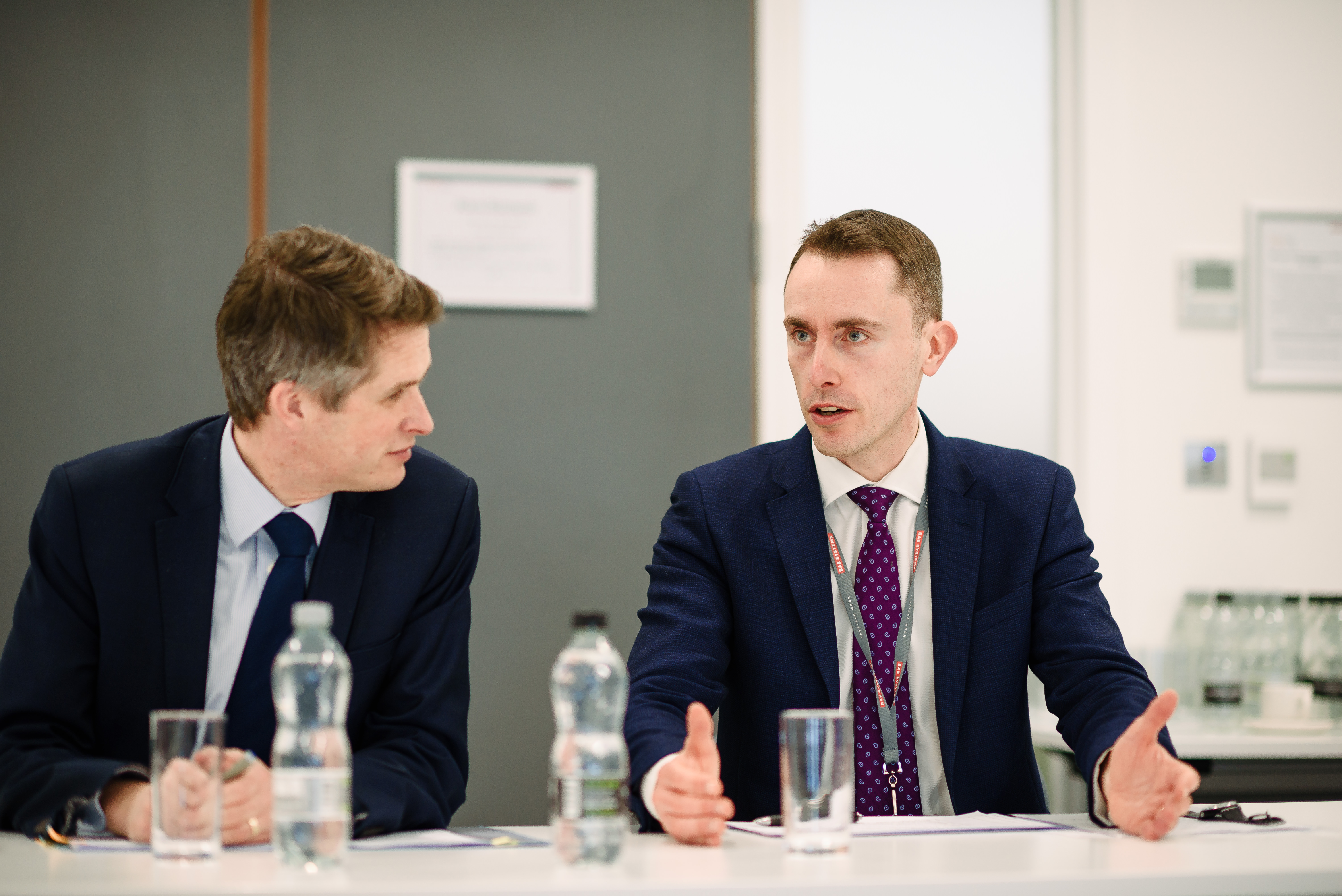Meet John Yarham: The careers guidance champion

When John Yarham was 16, he took a test at school that promised to reveal the career most suited to him. The result? A funeral director.
“My own career education was fairly minimal. I remember doing a test where you had to mark your interests and skills on a piece of paper and it got fed into a machine and told you what your career should be,” he remembers. “Mine came out with funeral director as the main thing. I laughed it off and didn’t take much notice.”
Three decades later and Yarham is at the forefront of ensuring that our young people have the opposite experience, and instead receive comprehensive and quality careers advice throughout their education, as deputy chief executive at the Careers and Enterprise Company. As youth unemployment rises - and young people’s hopes for the future diminish - it’s a role that is more important than ever.
News: Virtual work experience is here to stay, says expert
More: Careers advice crucial post-Covid, say teachers
Robert Halfon: Ofsted should rate schools on careers advice
Yarham grew up in a small village in the north of Norfolk: it was so tiny, in fact, that he was one of just three pupils in his class at his village primary school. His dad was a self-employed technician and his mum a primary school teacher - and Yarham says they each taught him and his sister different skills: his father encouraged him to be creative and have confidence in his sense of self, and his mother instilled strong values of fairness and integrity, as well as a drive to work hard.
At school, he says he was an “all rounder” who succeeded academically and enjoyed his work. Although a lot of his friends left school at 16 and went into trades, Yarham says he was expected to study A levels and go on to university. Today, “blind assumption” is something he challenges, he says.
“The expectation I’d go onto university and be fine gave me a false sense of what everything was about. It was quite a shock when I graduated: I was so naive. I chose to study politics because it’s what I enjoyed, but in retrospect, it wasn’t provocative enough. I hadn’t really thought about anything,” he says.
“I didn’t have an understanding of the world of work at all and I had very limited exposure. I didn’t really know a direction beyond my own academic interests.”
The difference that quality careers advice can make
Yarham graduated from Hull University, and had no idea what he wanted to do with the rest of his life. He worked in a couple of factories and for a chemicals wholesaler, before getting a role at a job centre. It was there that things started to change.
“It was in the middle of a recession, and it was The Full Monty: there were long queues out of the door. It was then I came across a good careers adviser,” he says. “I sat in on an interview with my colleague and I saw how developmental it was, what a difference she was making. The individual left feeling good about themselves. Whereas I, as a job centre member of staff, was basically asking, ‘Have you got a job? Are you looking for work?’”
Spurred on by witnessing the social difference that quality careers education could offer, Yarham went back to education himself, and studied a diploma in careers guidance at Nottingham Trent University.
“I learned that there’s a common misconception that careers guidance is matching a person to a job, and it really shouldn’t be,” he says.
“It should be about enabling, challenging, prompting and supporting them to get their self-awareness to the state where they can make some well-informed decisions. That’s what I believe in. Unfortunately, it isn’t always the case in how it’s been delivered historically, but it certainly should be.”

Careers adviser and coordinator roles across Oxfordshire followed - including one in which Yarham worked with disadvantaged young people in care, which he says was hugely rewarding. This is a cohort of students he still feels passionate about.
A move to Nottinghamshire involved Yarham joining the Learning and Skills Council (LSC), where he was responsible for coordinating the area reviews in the early 2000s. In this role, he was involved in the merger of four FE colleges to become Nottingham College, which exists today. He also worked on the introduction for the 14-19 diplomas, and thinks there was a missed opportunity with the Mike Tomlinson report and using diplomas as the route at 16 to combine academic and technical qualifications.
When the local LSC activities were moved into Nottingham City Council, Yarham became the director of young people’s learning and skills, before moving up to director of economic development. It was a huge brief, focusing on everything from business growth and homelessness to digital infrastructure and culture development. He says it was the hardest job he’s ever had to do, and although it was fascinating, it was exhausting, too.
Clear, honest and transparent leadership
But not one to shy away from a challenge, Yarham moved from one huge job to another, and became the chief executive of the Futures Management Group. The organisation had been in a perilous financial state - and during the six years he led it, it grew, developed and ultimately turned things around. There, he says, he really honed in on his leadership skills.
“As long as you’re really clear, honest and transparent, it goes a long, long way. At Futures, we had to make some hard decisions at times, certainly in the early days, and it was all about being clear about what we were doing and what the context was,” he says.
“It was all about the young people and adults we were working with, and we wanted to be clear we could offer a better service to them - that was the mission. When it comes to leadership, I think if you set out a vision and engage people in it, then they will deliver for you. That’s my ethos.”

After six years, Yarham felt he had taken Futures as far as he could, and felt that both the organisation and himself needed a change.
On his first day as deputy chief executive of the Careers and Enterprise Company, he got more of a change than he bargained for. Then chief executive Claudia Harris told Yarham she’d be going on maternity leave in six months’ time, and he’d need to step up to cover her role.
Careers education and the impact of Covid
As the months passed by, it became clear that Yarham’s time as interim chief executive would also coincide with the coronavirus pandemic and the lockdowns that followed. Yarham says it’s been a tough year for the organisation - and the young people it serves - and while he is really proud of what has been achieved, there’s still a huge amount of work to be done.
“When you look at the impact of Covid and what it’s meant, there are still lots of opportunities but there are so many, so many challenges now for young people. I want to be careful, if I’m honest, about overstating what is a really challenging situation. There is lots to feel proud of but we’ve got a massive job still,” he says.
He highlights an initiative called “My Week of Work” last year, which involved 120,000 young people and parents engaging in a national virtual work experience programme. The ability to reach employers right across the country from your front room, he says, shouldn’t be underestimated.
“One of the opportunities from those virtual encounters is being able to see employers you wouldn’t, that aren’t necessarily local to you. I think there was one young person from near where I grew up in Norfolk, who went to Jacobs in the Tees Valley virtually. They would never have done that normally,” he says.
The FE White Paper published earlier this year highlighted the importance of not just offering great careers advice from specific advisers, but from all teachers, too, and committed to including careers education in initial teacher training. It’s something Yarham says he is “strangely excited” about.
“What I believe in really strongly is if you’re relying on one hour to do this kind of thing, you can’t expect much. But if careers can be for young people a journey throughout their school and college, then they will be so much better placed to make stronger decisions,” he says.
“And actually, lots will come through the teachers themselves. It’s not just a career adviser or even the careers leader in the school or the college, it will be the teachers or the tutors in there. The more we can equip all of them to bring careers into their subjects, so in maths, what are all the careers which rely on maths, and bringing it to life and enabling teachers more generally to do that is a big prize we must go at. There was one line in the FE White Paper, and it was quite encouraging for me, because I think it’s the journey to utopia.”
And even when he isn’t working, Yarham finds himself immersed in conversations about careers with his own children. He has two daughters: one aged 12 and one aged 15, with the latter just starting to explore her career options.
“We’re trying to avoid the same situation I was in, where she is just pursuing some kind of academic route without any sort of understanding of how the world works... it’s been quite interesting,” he laughs.
And if the projections for youth unemployment throughout this year and next come to fruition, Yarham’s daughter and her peers right across the country will need to have a clear pathway in mind to avoid falling through the cracks in training and employment. Ensuring that quality careers advice and guidance is available to do that is no mean feat, but one which Yarham, in particular, has spent his entire career working towards.
You need a Tes subscription to read this article
Subscribe now to read this article and get other subscriber-only content:
- Unlimited access to all Tes magazine content
- Exclusive subscriber-only stories
- Award-winning email newsletters
Already a subscriber? Log in
You need a subscription to read this article
Subscribe now to read this article and get other subscriber-only content, including:
- Unlimited access to all Tes magazine content
- Exclusive subscriber-only stories
- Award-winning email newsletters